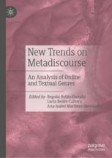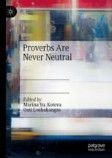Search
Search Results
-
“Not One of Our Experts.” Knowledge Claims and Group Affiliations in Online Discussions of the COVID-19 Vaccine
This chapter addresses the way scientific issues are discussed on social media, examining how individuals ground their knowledge claims on subjects...
-
Between Infotainment and Citizen Science: Degrees of Intended Non-expert Participation Through Knowledge Communication
An important part of scientific communication nowadays is to communicate backgrounds and results of research to the interested public and to other...
-
How Is Stickage Different from Sticking? A Study of the Semantic Behaviour of V-age and V-ing Nominalisations (on Monomorphemic Bases)
This chapter aims to provide a combined lexicographic and corpus-based distributional semantic analysis of the competing nominalisations V-age and...
-
Literature Review
This chapter is a review of studies on mood under three headings: a review of typological studies on mood, a review of SFL/SFT studies on mood, and...
-
“You are quite funny paa!”: A corpus-based study of borrowed discourse-pragmatic features in Ghanaian English
This study explores six borrowed discourse-pragmatic features – koraa/kraa, saa, paa, yoo, wai/wae , and waa ,– which are borrowed from indigenous...
-
A sequence labelling approach for automatic analysis of ello: tagging pronouns, antecedents, and connective phrases
Encapsulators are linguistic units which establish coherent referential connections to the preceding discourse in a text. In this paper, we address...

-
Variations on what for in the history of English
Constructions that question kinds have been discussed widely in Germanic, Slavic, and Baltic, but English and earlier stages of English have mostly...

-
Study One
This chapter reports on experimental Study One, designed mainly to explore the role of structural complexity and internal semantic relations in the...
-
Wonders that Speak: Computing the Poetics of Wonder in the Old English Andreas
From religious lyrics to homilies, Old English texts evoke wonder through mystery, inexpressibility, and unknowing; wonders are declared unknowable...

-
Rendering Morphosyntactic Features of Legal Spanish Judgments Using Neural and Statistical Machine Translation
Addressing machine translation (MT) in the legal context, this chapter compares Spanish-to-English neural MT (NMT) and statistical MT (SMT) output...
-
‘I Think, You Know…’: A Corpus-Based Analysis of Metadiscourse in Malaysian Online Podcasts
The digitaldigital world today offers new modes of communication that allow various channels for a more immediate and dialogical interaction. Within...
-
The implementation of writing pedagogies in the Write to Read intervention in low-SES primary schools in Ireland
This study describes the initial implementation of the writing component of the Write to Read ( W2R ) literacy intervention in eight low-SES...
-
Paralanguage in the Translation of Children’s Graphic Novels into Arabic: Jeff Kinney’s Diary of a Wimpy Kid
Graphic novels are marketed as helpful for reluctant young readers. The supplementation of text with visual stimuli as part of a multimodal narrative...

-
A pragmatic explanation of the mei-dou co-occurrence in Mandarin
Mandarin universal terms such as mei -NPs in preverbal positions usually require the presence of dou ‘all/even’. This motivates the widely accepted...

-
Hopes Woven in Smoke: Reimagining Virgil’s Aeneid in Irene Vallejo’s El silbido del arquero
This article investigates Irene Vallejo’s 2015 novel El silbido del arquero , a narrative in the Virgilian tradition mostly inspired by Book IV of the Aeneid...
-
A Corpus-Based Analysis of Ideologies in Chilean SLTE Policies
Second language teacher education (SLTE), particularly teaching English as a foreign language (EFL), has gained relevance over the last few decades....
-
Bulgarian Proverbs with Contradictory Opposition and Their English Parallels
This chapter considers contradictory relations manifested in Bulgarian proverbs. Contradiction is one of the basic and universal tools to cognize the...
-
Evaluation of a rule-based approach to automatic factual question generation using syntactic and semantic analysis
We present a rule-based approach to automatic factual question generation implemented in the Adaptive Courseware and Natural Language Tutor, a...

-
How do French students in primary grades process past participle inflections and their N-1 and N+1 in sentence dictation tasks? An analysis of the effects of verb frequency and verb consistency
The research presented in this paper aimed to serve two purposes. First, the objective was to understand the relationship between lexical and...

-
Мой или свой? Об эволюции притяжательных местоимений в русском языке после XVIII века
In this paper, I examine the distribution of personal and reflexive possessive pronouns referring to the 1st and 2nd person possessors in Russian...
